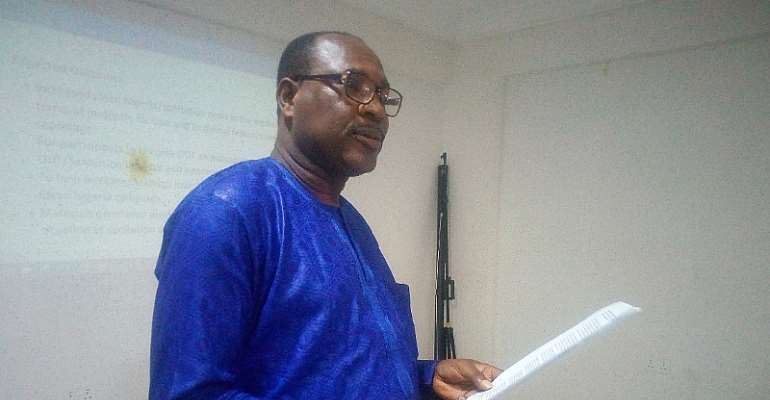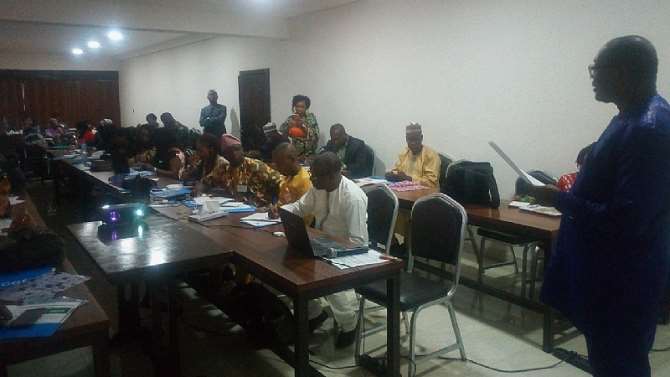FG begs Nigerians to build, use toilets

The Federal Government today pleaded with Nigerian to cultivate the habit of using toilets and desist from practising open defecations.
The Deputy Director in the Federal Ministry of Information and Culture who is also the Head, Child Rights Information Bureau, Mr Olumide Osanyinpeju made the plea in Kano.
He spoke at a Media Dialogue for selected journalists on Sanitation and Hygiene which was tagged “Clean Nigeria: Use the Toilet”, using hashtag #Endopendefecation #cleannigeria.
The meeting was organised by FMI/CRIB in collaboration with the United Nations Children Fund (UNICEF) the European Union and the Department for International Development (DFID/UKaid).
Osanyinpeju lauded UNICEF and other partners for the their efforts in curtailing the practice of open defecation in Nigeria.
He said "It is a fact that UNICEF has been in the forefront of ensuring that we have access to safe drinking water supply, adequate sanitation and proper hygiene in our environment and communities.
"I therefore commend UNICEF, other groups and individuals for also advancing this cause to make life safe in our communities."
While speaking, UNICEF Communication Specialist, Dr Geoffrey Njoku urged the media to step up reportage of issues around sanitation and to sensitize the people on the need to shun open defecation and imbibe use of toilet.
Dr Njoku urged media practitioners to use their tools to raise awareness on the benefits of cleanliness and the dangers of open defecation to their health and wellbeing.
The UNICEF Chief of Katsina Field Office, Mr Paul Mudzougo who was represented by Mr Niyi Oyedokun also charged the journalists to enlighten members of the public on the need to stop open defecation in Nigeria.
UNICEF Water, Sanitation and Hygiene (WASH) Specialist, Bisi Ogunjobi said 47million Nigerian are still practising open defecation. He said the situation must be addressed so that government would stop using resources meant for development of infrastructure on payment of medical bills.
Speaking further, Osanyinpeju said the federal government would not relent in the campaign to end open defecation in the country.
He also said that government recently declared a state of emergency on WASH Nigeria and launched an Open Defecation Free (ODF) campaign strategy to jump-start the country’s journey towards ending open defecation.
His said "The Federal Ministry of Water Resources with support from UNICEF, in partnership with Inter-Ministerial Agencies, Civil Society Partners, the Private Sector, and the people of Nigeria, is currently leading the ODF campaign to end open defecation in the country by 2025, and achieve universal access to safely manage sanitation by 2030.
Osanyinpeju said the "Clean Nigeria: Use the Toilet" campaign is one of the most ambitious behaviour-change campaigns in Nigeria with a strong citizen / public engagement component.
"Leveraging on what is currently working in the States with Local Government Areas’ certified ODF; this campaign mode will create a national movement with elements of policy advocacy, public advocacy, grassroots mobilization, and private sector engagement."
"Sanitation is essential to the survival and development of children. It can reduce the severity and impact of malnutrition. It can also help in reducing the spread of intestinal worms, as well as promoting dignity and boosting safety, particularly among women and children", he said.
Osanyinpeju added that sanitation standards are intended to ensure that people do not suffer adverse health effects that can result if toilets are not available when needed. He said proper sanitation facilities would promote health because it allows people dispose off their waste appropriately.
"Open defecation perpetuates a vicious cycle of disease and poverty. Inadequate waste disposal promotes the infection cycle of many agents that can spread through contaminated soil, food, water and insects such as flies. Open defecation is incredibly dangerous, as contact with human waste can cause diseases such as cholera, typhoid, hepatitis, polio, diarrhoea, worm infestation and under nutrition."
"We must double our current efforts in order to end open defecation by 2030.
Ladies and gentlemen, there is need to increase awareness about the impact of open defecation in Nigeria. The Media is a strong vehicle to communicate the message."
Osanyinpeju said the 'End Open defecation Free and WASH programmes were integral parts of SDG 6 and that it is critical to intensify efforts in tackling them. "It is against this backdrop that the process recognised that there is dire need to constantly leverage on media alliance in this process because the media is a critical partner in achieving success in the WASH and End ODF programmes."
He said the media dialogue on sanitation and the campaign to end open defecation targets three States including Kano, Osun and Cross River and that it is aimed at creating awareness about “Clean Nigeria: Use the Toilet” campaign, and mobilize resources to sustain the national movement.
"It calls for behaviour change and policy reform through community dialogues to raise public awareness by setting agenda for children issues within the framework of child rights. It also creates a deeper understanding of the needs of children among people, government and institutions, while defining the role of the society in meeting those needs."
He charged pressmen to arm themselves with in-depth knowledge of WASH to enable them write factual stories. "Make the stories compelling by adding an unusual angle to them", he said.
"Considering your importance as custodians of the pen, your technical guidance for the media on sanitation issues, through sharing of information and experience on the subject matter cannot be over emphasized. l wish to therefore remind you that your concerted efforts are still needed to push this cause further, through your stories in order to address the gaps which have been identified to support sanitation and hygiene in our communities", Osanyinpeju told the journalists
He also advised the journalists to prioritize reportage of sanitation and hygiene so as to boost health services across the country. "As journalists, being presented with facts of data on the status of sanitation in these areas, I enjoin you to use the medium at your disposal to educate the populace with the sanitation situation in Nigeria, with particular reference to child development.
"You are to ensure that children issues are reported in a way that would elicit responses from different levels of stakeholders, causing them to meet their obligations to children as duty bearers. You should respect, protect, project and fulfil the rights of children as you are equally duty bearers to set agenda, use narratives and give voice to issues concerning children",

